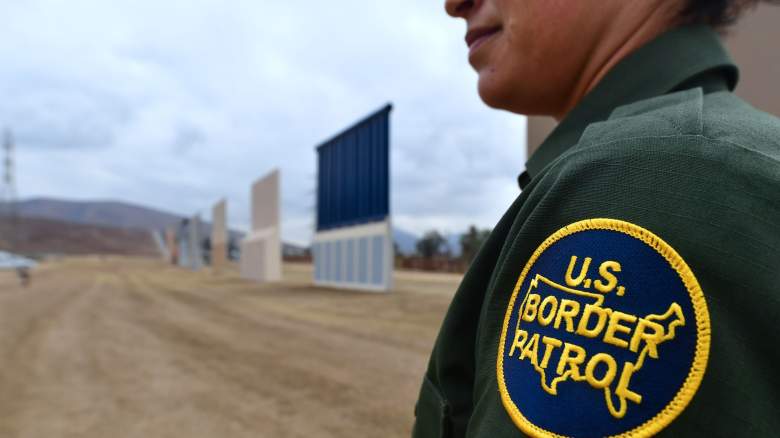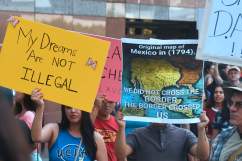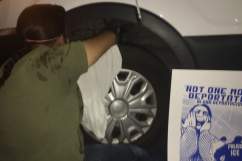
Getty US Border Patrol officer Tekae Michael stands near prototypes of US President Donald Trump's proposed border wall on November 1 in San Diego, California.
Agents of the U.S. Customs and Border Protection said they detained and arrested the man who is believed to be the first person protected by the Deferred Action for Childhood Arrivals immigration policy to be deported under President Donald Trump.
Juan Manuel Montes-Bojorquez, 23, had qualified for the DACA program but was deported back in February by federal agents. After sneaking across the border and getting caught and deported once again, Montes filed a lawsuit against the government. While he was awaiting for the court proceedings to begin, though, Border Patrol agents said they saw him cross the border and detained him.
Here’s what you need to know about Montes:
1. Montes Was Deported in February by Border Patrol Agents
Montes was deported just weeks after Trump took office. He was detained and deported in February, and activists supporting his cause said his impending deportation was an example of the Trump administration breaking its promise not to go after “Dreamers.”
Montes and his attorney wrote in a court document that he was working in the fields in California and arrived home from work during the afternoon. During the evening hours, after trying to meet up with a friend near the U.S.-Mexico border, Montes claimed he was stopped on his way to a taxi stand by an officer he believed to be a Border Patrol agent. He said he didn’t have his identification on him at the time, and he was taken into custody where he was questioned for hours.
In the early morning hours of February 19, Montes said he was brought out by agents with others to the U.S.-Mexico border and told to walk straight to Mexicali.
“I didn’t think I had a choice,” he wrote. “I knew he was kicking me out of the country, but I didn’t know why.”
Montes said that after his deportation, he wasn’t sure what to do and didn’t know where to go. He claims that he walked to a park, where he tried to get in contact with friends. He ended up contacting his mother, who he met at the border to drop off a suitcase full of clothes. Montes said one his walk back, he was attacked and his belongings were stolen.
Montes wrote that he walked across the U.S.-Mexico border at around 7 p.m. on February 19 and hid for about 30 minutes after crossing. As he saw Border Patrol agents approaching, he said he turned himself in and was deported back to Mexico, where he was staying with family members.
“I have been very stressed and sad since I was kicked out of the U.S. because I miss my family,” he wrote in a court document. “I mostly miss my mom and my little brother very much. It is very hard emotionally to be separated from them. We are very close. I feel sad and alone without them. I talk to my mom and my little brother every day on the phone. While I don’t really understand what my little brother says because he is only 3-years old, I try to talk to him. I cry often when I think about my family and when I think about how much I want to go back home. I also get headaches often. I am not sure why since that wasn’t a problem before I was deported.”
Montes and his family were in the process of suing the U.S. government because of his deportation. The government argues that his attempt to get back into the U.S. negated his DACA protections.
2. He Was Awaiting His Court Hearing When He Was Most Recently Caught Across the Border
Montes quickly rose to become the “face” of the pro-DACA movement, in which various protests and rallies have taken place across the nation. On November 8, though, the Border Patrol said that Montes was caught and arrested once again for trying to sneak back into the U.S. without permission. He was living in Mexico awaiting for the court proceedings to start, but Assistant Chief Patrol Agent David S. Kim said he was found near Calexico.
“Our agents witnessed and arrested Mr. Bojorquez making an illegal entry into the United States for the second time this year,” Kim said to The Washington Times. “Border Patrol Agents will always stop, detain, and arrest anyone making an illegal entry into the country irrespective of their immigration or citizenship status.”
Authorities said they will charge him with re-entry into the U.S. after removal; a felony with a punishment of up to two years in prison.
3. Montes Attended Community College & Wanted to Become a Police Officer
Montes was born in Mexico and arrived in the United States with his mother when he was 9-years old. The family lived in Imperial Valley, California, and Montes graduated from high school in 2013. After his graduation, Montes took classes at a community college with the hopes of getting an associates degree in welding. In an official declaration issued in the U.S. District Court for the Southern District of California, Montes said his goal was to eventually become a police officer or security guard.
In the court document, Montes said he suffered a “traumatic brain injury” when he was a child and developed a tic in his eyeballs that get worse with stress. He was getting assistance from a psychiatrist for several years prior to his deportation.
Montes wrote that he was encouraged by his mother to apply for DACA, a program she heard about through mutual friends. The family hired an attorney to help with the application, which was approved in 2014 and then renewed for another two years in 2016. His work permit was set to expire in January 2018.
Montes said that prior to his deportation, he worked in the fields so he could pay for his college courses and had to take a break from school to save money.
4. Obama Announced the DACA Program in 2014
Despite not being born in the U.S., Montes was approved in 2014 for the DACA program under then-President Barack Obama. That policy allowed for some people who entered the country as minors and have remained in the country illegally to receive a renewable period of deferred action from deportation. The period lasted two years and allowed those immigrants to be eligible for a work permit. In order to be eligible to enroll on the program, “Dreamers” couldn’t have a felony or serious misdemeanors on their criminal record.
The Obama administration announced the policy with a speech in the Rose Garden at the White House in 2012. The U.S. Citizenship and Immigration Services started accepting applications for the program in August 2015.
The U.S. Department of Homeland Security reported that there were about 800,000 people in the U.S. who were enrolled in the program by 2016. A 2015 report by the Institute for Research on Labor and Employment found that the DACA program raised wages, increased the labor force participation of those immigrants and reduced the number of unauthorized immigrants living in poverty.
Later in 2014, Obama said he would expand DACA so it would cover more illegal immigrants. However, it was met with disagreement, and multiple states sued the federal government to prevent the expansion and it ended up being blocked in courts. The expansion was officially withdrawn by the Department of Homeland Security on June 16 under Trump, and it said it would review the entire DACA program.
5. The Trump Administration Said It’d End DACA in September
On September 5, the Department of Justice announced it was ending DACA. With that, the process was to be delayed six months so that Congress had enough time to figure out how to deal with those who were eligible under the old policy.
Under Trump’s plan, as announced by Attorney General Jeff Sessions, new applications for legal status would stop being accepted. However, those with a permit that’s set to expire before March 5, 2018 was granted the opportunity to apply for a two-year renewal.
Trump said in a statement following the announcement that the move was “in the best interests of our country” so that it could “begin an orderly transition and wind-down of DACA.”
I am not going to just cut DACA off, but rather provide a window of opportunity for Congress to finally act.
We will resolve the DACA issue with heart and compassion — but through the lawful democratic process — while at the same time ensuring that any immigration reform we adopt provides enduring benefits for the American citizens we were elected to serve.
Trump also said he advised the Department of Homeland Security not to enforce priorities on DACA recipients “unless they are criminals, are involved in criminal activity, or are members of a gang.”
Sessions, on the other hand, called DACA unconstitutional and said that it “denied jobs to hundreds of thousands of Americans by allowing those same jobs to go to illegal aliens.”
We are a people of compassion and we are a people of law. But there is nothing compassionate about the failure to enforce immigration laws.
The compassionate thing is to end the lawlessness, enforce our laws, and, if Congress chooses to make changes to those laws, to do so through the process set forth by our Founders in a way that advances the interest of the nation.



